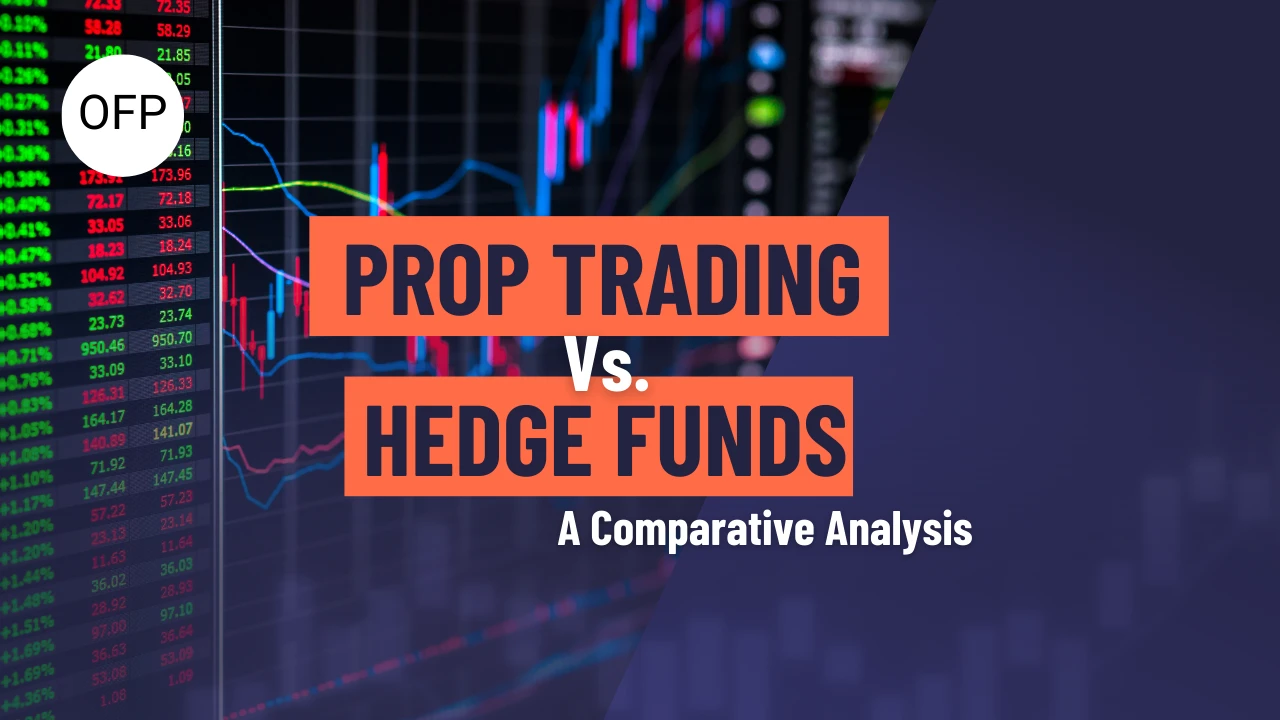
Proprietary trading firms (prop trading) and hedge funds are two of the most well-known investment vehicles, both aiming to generate significant returns. Despite their similar goal of making money from financial markets, they operate very differently and cater to distinct types of investors. In this article, we’ll break down the key differences between prop trading and hedge funds, exploring accessibility, structure, fees, and investment approaches, to help you decide which option best aligns with your financial goals.
Table of Contents
Accessibility and Structure: Who Can Invest?
Prop Trading:
At the core of proprietary trading is the use of the firm’s own capital to make trades. Traditionally, prop trading was reserved for professional traders within firms, but with the rise of online proprietary firms, retail traders now have the opportunity to access substantial capital and trade alongside seasoned experts. In the case of firms like OFP Prop Firm, traders can access up to £5 million in funding, depending on their account model, and keep a portion of the profits.
Retail traders can gain access to these funds by passing certain evaluations and meeting performance benchmarks, often without needing a significant initial investment. This makes trading increasingly popular among individual traders who might not have the capital to trade on their own.
Hedge Funds:
Hedge funds, on the other hand, operate as limited partnerships and are typically open only to high-net-worth individuals and institutional investors. These funds require significant initial investments, often in the millions, and they offer less flexibility in terms of participation. The structure of hedge funds is more rigid, as investors must meet strict qualifications to join. Hedge fund managers employ strategies designed to protect and grow investors’ capital over the long term, often using a variety of complex techniques to generate returns.
While hedge funds may be less accessible to the average retail investor, they are highly attractive to those who have the resources and appetite for higher-risk, potentially higher-return opportunities.
Comparing Fees and Compensation: How Are Traders and Investors Paid?
Prop Trading:
One of the main advantages of proprietary trading is the compensation structure. Traders typically receive a share of the profits they generate from trading, often referred to as a profit split. For instance, traders with OFP may receive up to 25% of the profits they make, which aligns the firm’s success with the trader’s performance. The profit split creates an incentive for traders to perform at their best, as their earnings are directly tied to the success of their trades.
Hedge Funds:
In contrast, hedge funds charge both management and performance fees. Management fees are typically around 2% of the assets under management (AUM), and performance fees can be as high as 20% of the profits generated. These fees cover the operational costs of the fund, including salaries for fund managers and other staff, as well as various administrative expenses. While the performance fee structure incentivizes hedge fund managers to generate profits, these fees can reduce the overall returns for investors.
For both options, the fee structures are designed to compensate the professionals for their expertise and the resources they bring to the table, but the costs can add up significantly in the case of hedge funds, particularly if the fund is underperforming.
Investment Approach: How Are Profits Generated?
Prop Trading:
These trading firms use their own capital to make trades across various financial markets, including stocks, forex, and commodities. The traders working for these firms are responsible for executing trades based on market research, news, and analysis. They make profits through their ability to predict market movements and capitalize on them.
The firm may have specific requirements for traders, such as a minimum level of experience or a financial background, but the key aspect of proprietary trading is that it allows traders to act independently, using firm capital while taking on the risks themselves. The focus is typically on short-term, high-frequency trades, where quick decision-making and risk management skills are paramount.
Hedge Funds:
Hedge fund managers employ a variety of strategies to generate returns, often with an emphasis on risk management and capital preservation. These strategies can include long and short equity positions, fixed-income trading, options, futures, and even complex derivatives like credit default swaps (CDS). Hedge funds are typically more diversified than proprietary trading firms and may also trade in non-traditional assets such as private equity, real estate, and commodities.
Hedge fund managers usually target stable, long-term returns, focusing on wealth accumulation for their investors. The strategies are often more complex and involve leveraging assets to maximize returns. This is why hedge funds are considered a more hands-off investment option compared to prop trading, where traders are more actively involved in the daily management of trades.
Risk and Reward: Which Option Offers Better Opportunities?
Prop Trading:
The risk in proprietary trading is shared between the trader and the firm. While the trader is responsible for the trades they make, the firm provides the capital to make those trades. However, the trader must often adhere to specific rules and guidelines set by the firm, such as max drawdown limits and risk management protocols. Failure to follow these rules can result in account suspension or forfeiture of profits.
For traders, the reward comes in the form of the profit split and the ability to scale their trading accounts as they progress. Trading firms like OFP allow traders to grow their accounts and manage larger sums of capital over time. The potential for profit is substantial, especially if traders demonstrate consistent success, but so is the potential for loss if they fail to manage risk appropriately.
Hedge Funds:
Hedge funds, while offering the opportunity for significant returns, typically involve lower risk tolerance for individual investors, since they aim for stability and capital preservation. Hedge funds are often more diversified in their investments, which means the risk is spread out across various asset classes, reducing exposure to any one specific risk factor. Investors in hedge funds are generally passive, relying on fund managers to make decisions on their behalf.
The reward for hedge fund investors comes in the form of long-term, stable growth of their portfolio. While individual returns may vary, the hedge fund manager’s expertise is a crucial factor in generating those returns. Hedge funds also typically have higher minimum investment requirements, making them less accessible for smaller-scale investors.
Conclusion: Which Option Is Right for You?
In conclusion, both proprietary trading and hedge funds offer unique opportunities to generate profits in the financial markets. Proprietary trading may be more accessible to retail traders who want to leverage firm capital to make independent trading decisions. In contrast, hedge funds cater to high-net-worth individuals and institutional investors, offering a more hands-off approach to investing with a focus on long-term, stable returns.
For individual traders, the choice between prop trading and hedge funds depends on their investment goals, risk tolerance, and level of experience. Proprietary trading offers more flexibility and immediate access to capital, while hedge funds provide more security and long-term growth opportunities. Regardless of the choice, traders and investors must weigh the pros and cons of each option to determine which best suits their financial objectives.
Ready to Elevate Your Trading with Higher Leverage and Customizable Profit Split Options? CLICK THE BUTTON BELOW and customize your Instant Funded account with OFP Funding today!






